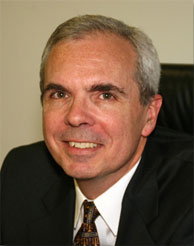White collar 101: Clinton Calhoun
There are few people in Westchester who know more about white collar law than White Plains attorney Clinton Calhoun.
Calhoun has been a practicing attorney since the mid 1980s, initially starting out in the district attorney”™s office. Now a defense attorney at Calhoun & Lawrence L.L.P., Calhoun has been on both sides. He said he doesn”™t believe that the economic recession has caused a spike in white collar crime.
“It seems like it”™s been pretty steady,” Calhoun said. “A lot of the activity that”™s coming to light now in the courts is probably the product of activity that occurred when the economy was stronger.”
Cornell University Law School defines white collar crime as a variety of nonviolent crimes usually committed in commercial situations for financial gain.
Calhoun said mortgage fraud has been especially prevalent in Westchester. Mortgage fraud cases include people falsifying information on mortgage applications or mortgage brokers diverting funds.
“There”™s quite a variety of ways that you can commit fraud,” Calhoun said. “When lending standards were looser, a lot of misrepresentations weren”™t picked up. Not a lot of attention was paid to them.”
Calhoun said he doesn”™t think that many people end up getting away with mortgage fraud, as investigations spring into action when people notice that money is gone.
“There”™s a whole range of bad things that can happen when fraud is discovered,” Calhoun said. “The worst is being criminally prosecuted, convicted and sent to prison. That”™s as bad as these cases get. Not all cases go that route.”
Identity theft has also become a frequent crime, though federal prosecutors have been cracking down harshly. The U.S. Attorneys”™ Office automatically adds two years in prison to any sentence involving identity theft.
“The consequences are bad,” Calhoun said. “A conviction means a loss of freedom.”
White collar crime knows no gender, demographic, race, color or creed.
“We”™ve had clients that are across the spectrum,” Calhoun said. “It”™s an equal opportunity crime.”
Calhoun said he defends about 12 to 15 white collar crimes a year. He said that in sentencing, judges are often very firm and can be unsympathetic when dealing with white collar criminals.
“The defendants often come from privileged backgrounds or at least had better options in life,” Calhoun said. “The reasons are for committing white collar crimes usually aren”™t very good. It”™s because of greed and wanting to finance a lifestyle they couldn”™t finance otherwise.”
